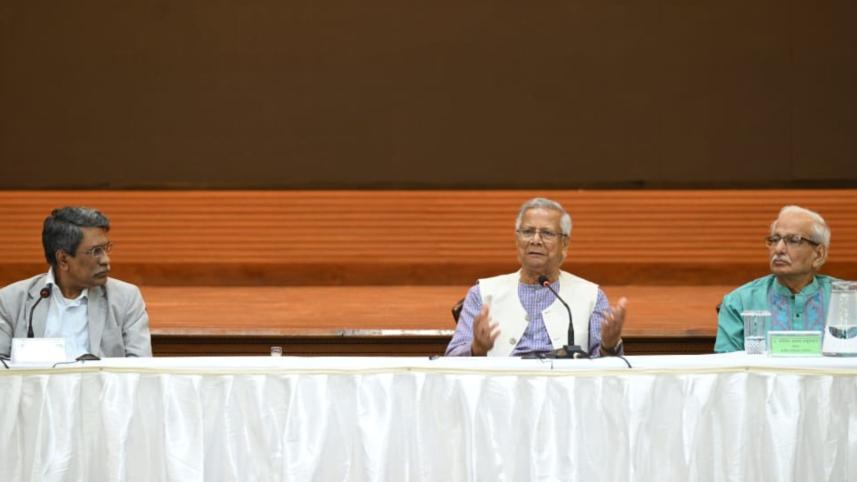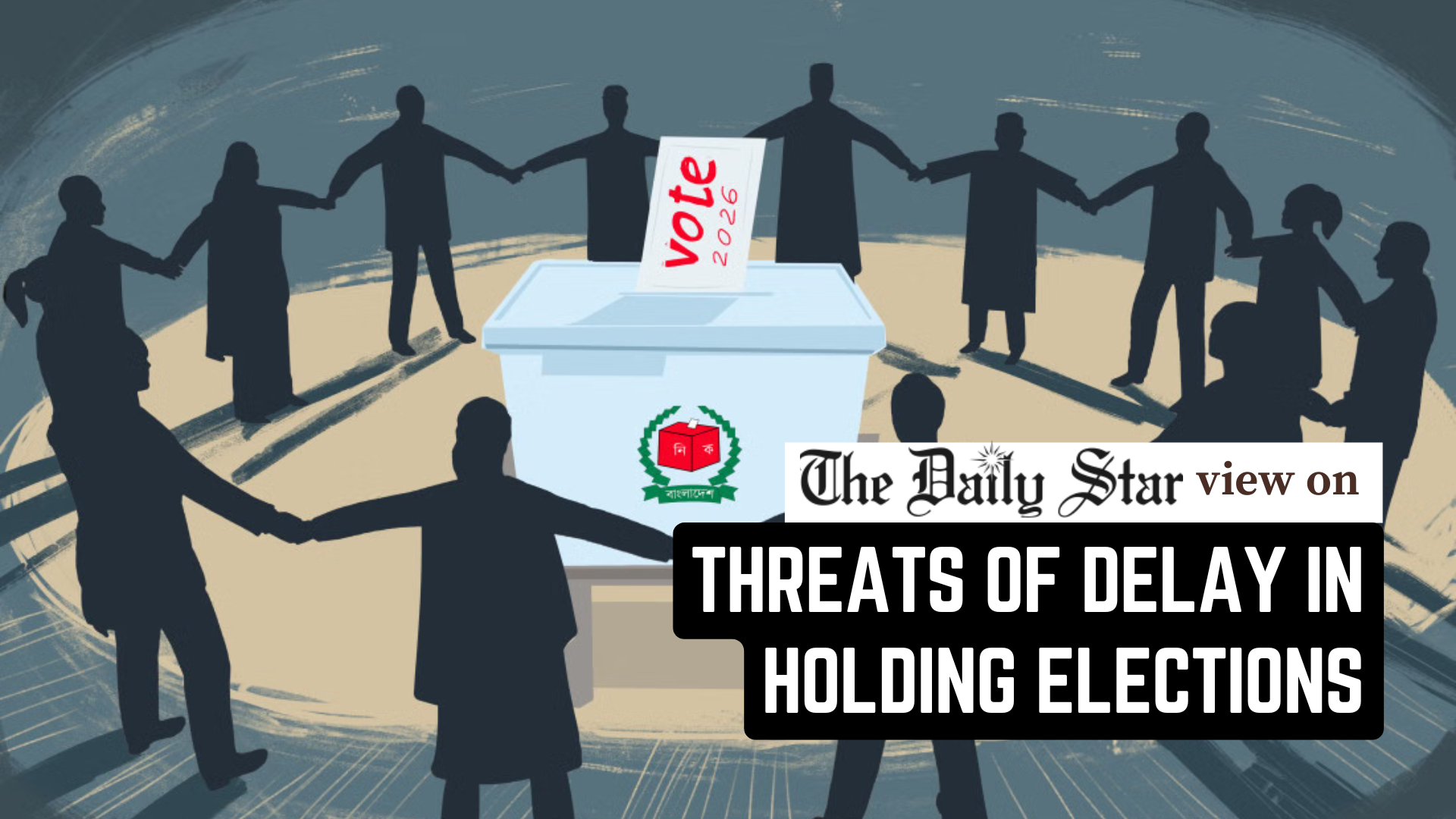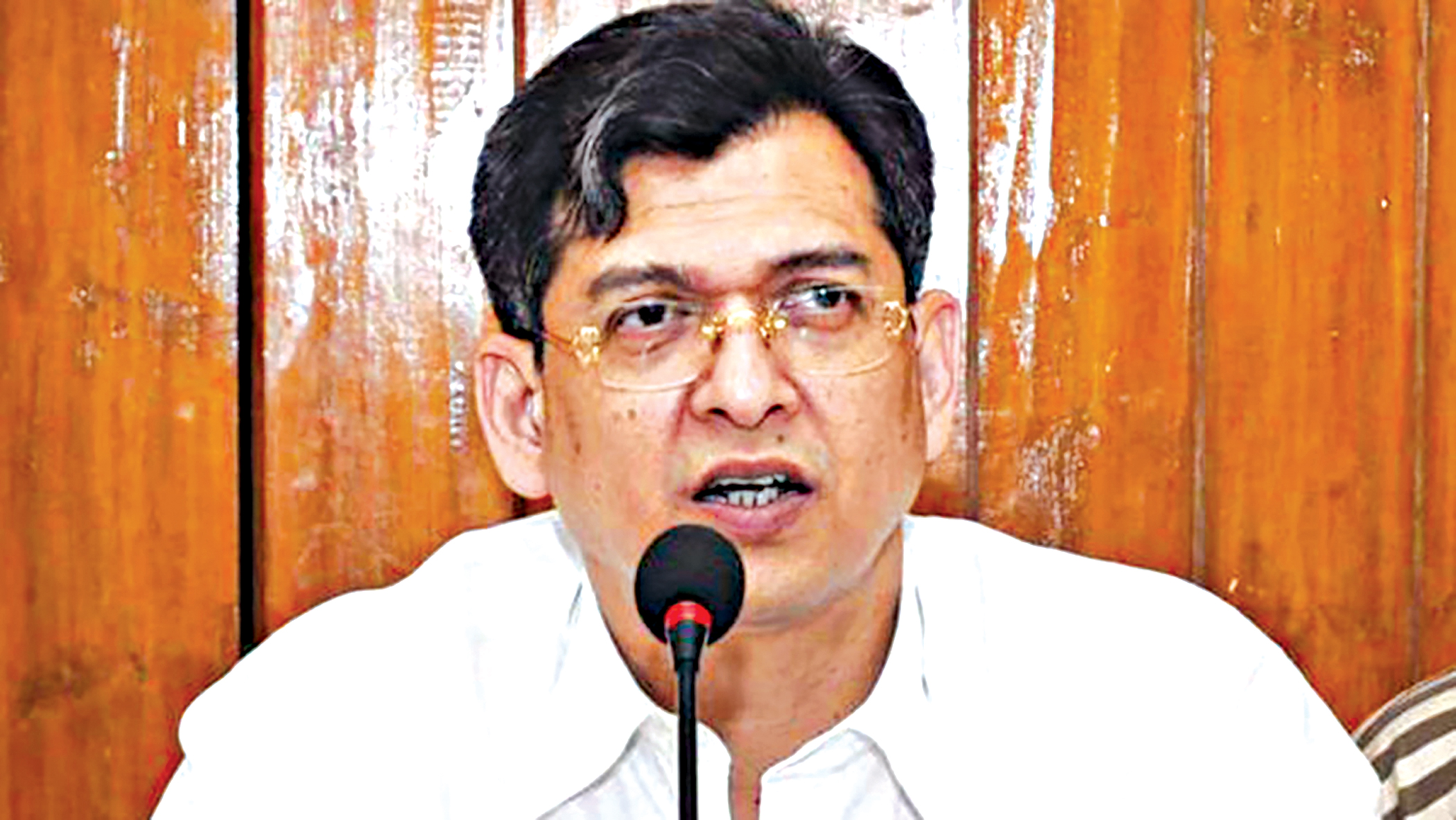Consensus a must, election to be a ‘grand festival’

"All ways for dictatorship must be blocked. Everyone must agree to stop dictatorship … I call on everyone to agree on the charter so that the election can be meaningful."
Chief Adviser Prof Muhammad Yunus yesterday stressed that there is no alternative to consensus on the July Charter, warning that any delay or disagreement could threaten the nation's hard-won stability.
"There is no turning back from the path we have embarked upon. We must reach a consensus. I may be speaking strongly, but this cannot be ignored," he told political leaders.
He sat with the politicians as part of National Consensus Commission talks amid persistent rift over how to implement the July Charter, a document consisting of reforms agreed upon during the dialogues.
Yunus, also the chair of the commission, said the student-led July uprising had created a unique opportunity for a new beginning, and that the only way to secure it was through cooperation and compromise.
"We can argue endlessly, but we must stay on the path of solutions. Some may feel discomfort now, but later there will be peace, and the nation will benefit. If we remain mired in disputes, we cannot predict when or where they might erupt," he said.
Describing the consensus commission's work as unprecedented, Yunus said, "This initiative was not taken from any book. Considering the current situation, we tried this method to solve the problem.
He urged the parties to complete the final stage of implementation flawlessly, so that the commission could set "a global example" for resolving political crises.
Turning to the February election, he said it would be more than just a vote. "The election will be a grand festival, the true rebirth of the nation. All the sacrifices and bloodshed will become meaningful if we achieve this new beginning. We must not get lost in minor issues; aim for the bigger goal."
On reforms, Yunus called for unity to prevent any return of authoritarianism. "All ways for dictatorship must be blocked. To stop dictatorship, everyone must agree. There can be no dissent. If disagreement remains, we cannot complete this process. I call on everyone to agree on the charter so that the election can be meaningful," he said.
BNP OPEN TO MORE TALKS
During the meeting on the second day of the third phase of talks between parties and the consensus commission, BNP Standing Committee member Salahuddin Ahmed cautioned against linking reforms, justice, and elections.
"Reforms are a continuous process. Justice cannot be bound by time limits; otherwise it will lead to injustice. Whoever comes to power, trials must continue. But elections cannot be made conditional."
Warning that any delay could trigger instability, Salahuddin said, "If the election is not held in February, it will create uncertainty and open opportunities for fascist forces. Some are calling it a national security threat, but I say it could become a regional security threat. Two regional powers may exploit this situation. We do not want Bangladesh to fall into that trap."
About the July Charter, he said the BNP was open to further discussions on whether to give the document a legal basis.
He said most provisions of the charter were simple to implement, but constitutional issues might require advisory opinions from the Supreme Court under article 106 of the constitution.
"We are open to that. Beyond that, if there are other legal options, let us know -- we are ready to sign the charter," he said.
He added that while no document can stand above the constitution, a Special Constitutional Order after consultations could provide stronger legal safeguards.
"We are ready to compromise, to negotiate further if necessary. This charter must be a national, political, and historical document, free from clerical errors or confusion.
"Issues not discussed in detail should not be inserted at the last moment; otherwise, unnecessary controversies will arise," he said.
JAMAAT FOR PCO OR REFERENDUM
At the meeting, Jamaat-e-Islami Assistant Secretary General Hamidur Rahman Azad said his party believes the upcoming election will only be free, fair, and acceptable if it is held based on the July Charter.
The Jamaat wants the July Charter to be implemented through a Provisional Constitutional Order (PCO) or by referendum to prevent any political party from challenging the charter in court.
"There are precedents for both. If the political parties fail to reach a consensus, the people can deliver their verdict through a referendum," Azad said.
In a set of proposals submitted to the National Consensus Commission, the Jamaat has said all parties and candidates must swear an affidavit or oath of allegiance to the charter as a precondition for participating in elections.
Those refusing to do so, it suggested, should be disqualified.
The party further proposed that any candidate who campaigns against the charter should face not only disqualification but also sedition charges.
Speaking to journalists after the meeting, Azad defended the proposal.
Asked whether requiring an affidavit, oath, and punishing dissent would amount to forcing people, he said it was not about coercion but about honouring the July uprising.
"Anyone who rejects the July Charter would, in effect, be siding with fascism," he said. "If you deny July, you deny the revolution. Then how can you do politics in Bangladesh?"
He added that just as politics must be based on the spirit of the 1971 Liberation War, future politics must also be based on the July Charter, and those unwilling to accept it should not be allowed to contest elections.
According to the party's proposal, the Provisional Constitutional Order implementing the July Charter shall remain valid and enforceable until a new constitution is passed by parliament with at least a three-fourths majority and subsequently ratified by the citizens of Bangladesh through a referendum.
The Jamaat further recommended that all provisions of the new constitution must remain consistent with the principles of this order.
Once the constitution is adopted, its legality and constitutionality should no longer be open to challenge by any authority, the party said.
It added that all institutions and authorities would be considered created and governed under the framework of the new constitution.
The party argued that this step is necessary to prevent any political party from legally disputing the July Charter in the future, thereby providing a stable foundation for reforms, governance, and upcoming elections.
The Jamaat leader also responded to a question about the party's opposition to the creation of Bangladesh during the Liberation War.
"We have always done politics by following Bangladesh's legal and constitutional process. We have repeatedly said that the Liberation War of Bangladesh is our achievement. Everyone is doing politics by accepting Bangladesh, and so are we. Therefore, there is no scope to bring back old debates. If the Liberation War is not accepted, it is in fact rejecting Bangladesh," he said.
NCP FOR CONSTITUENT ASSEMBLY
Akhter Hossen, member secretary of the National Citizen Party, said his party believed only a constituent assembly election could guarantee the sustainable implementation of the reforms.
"A new constitution, written with fresh clauses and articles, is necessary to make the agreed reforms effective," he said, warning that ordinary amendments could be challenged and struck down in court.
He noted that the commission's discussions had identified two types of reforms: those achievable through ordinances or executive orders, and those requiring major structural changes to the constitution.
"Such big changes cannot be made sustainable by ordinary constitutional amendments alone. That is why the political parties must agree on a proper method," he added.
In his opening remarks, the commission's Vice-President Prof Ali Riaz urged political parties to protect their unity and cooperation until the July Charter is fully implemented. "Fascist forces and their allies are still trying to thwart the state reform process," he warned.



 For all latest news, follow The Daily Star's Google News channel.
For all latest news, follow The Daily Star's Google News channel. 

Comments